英语1A2A
人教新目标版初中英语八年级上册Unit1SectionA2(grammarfocus-3c

Unit 1 Where did you go on vacation?Section A2 (Grammar focus-3c)【学习目标】1. 理解并掌握下列词汇及短语:any where, some one, someth ing, no thi ng, every one, myself, yourself, yourselves, hen, pig, seem, bored, of course2. 理解并掌握下列重点句子:1) How did you like it?2) Still no one seemed to be bored.重点语法:1) 一般过去时肯定句:We took quite a few photos there.2) 一般过去时一般疑问句及答语:-Did you do any thi ng special last mon ths? -Not really.3) 一般过去时特殊疑问句及答语:-How was the food?-Everything tasted really good.4) 动词过去式不规则变化3. 学会用一般过去时态描述曾经度过的假日。
4. 学会用一般过去时进行信息交流。
【重点和难点】1) 用一般过去时进行信息交流。
2) 不定代词someth ing, anything, nothing, everythi ng, some one, anyone, no one,every one的用法。
【课前预习】一、生词检测:任何人_________ 在任何地方_________ 某事;某物__________某人_________ 没有什么;没有一样东西 _________ 我自己______ 你自己_________、预习检测你能用英语写出下列短语吗?购物____________ 当然;自然__________________在乡下___________ 喂母鸡________________记日记___________【合作探究】阅读Grammar Focus中的句子,然后做填空练习。
2019人教版初一英语Unit1sectionA2a2d课例分析语文
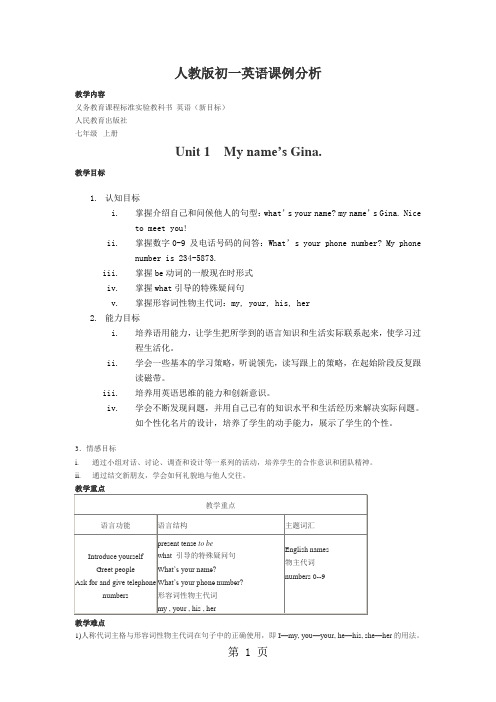
人教版初一英语课例分析教学内容义务教育课程标准实验教科书英语(新目标)人民教育出版社七年级上册Unit 1 M y name’s Gina.教学目标1.认知目标i.掌握介绍自己和问候他人的句型:what’s your name? my name’s Gina. Niceto meet you!ii.掌握数字0-9 及电话号码的问答:What’s your phone number? My phone number is 234-5873.iii.掌握be动词的一般现在时形式iv.掌握what引导的特殊疑问句v.掌握形容词性物主代词:my, your, his, her2.能力目标i.培养语用能力,让学生把所学到的语言知识和生活实际联系起来,使学习过程生活化。
ii.学会一些基本的学习策略,听说领先,读写跟上的策略,在起始阶段反复跟读磁带。
iii.培养用英语思维的能力和创新意识。
iv.学会不断发现问题,并用自己已有的知识水平和生活经历来解决实际问题。
如个性化名片的设计,培养了学生的动手能力,展示了学生的个性。
2)了解英语与汉语中姓与名位置摆放的不同之处,准确掌握英语的姓与名的正确表达。
3)be动词的正确搭配和使用教学理念教学中做到面向全体学生,注重素质教育,关注每个学生的情感,激发他们学习英语的兴趣,倡导任务型的教学模式,让学生在教师的指导下,通过Pairwork 、Groupwork 等实现任务的目标,增强实践能力,培养创新精神,促进语言实际运用能力的提高。
教学媒体的运用本节课在教学手段的选择上是从学生年龄特征、学习兴趣的角度出发的。
本节课主要采用录音机、图片、多媒体等作为教学辅助手段,它集音、图于一体,形象、生动、直观,能快速从视、听的角度吸引学生的注意力,能加快教学节奏,加大教学容量。
教学流程Step 11. G reet with the students by using “good morning/ good afternoon/hello/ hi…” And help the students to respond . 【开始上新课前和学生们问好,一来用于复习在之前预备单元中学到的知识点,二来让学生更好地融入到英语课堂中来,属于“热身”(warm up)】2.使用多媒体在大屏幕上显示一些物品的图片,用于展示新的单词。
英语级别 0-level介绍
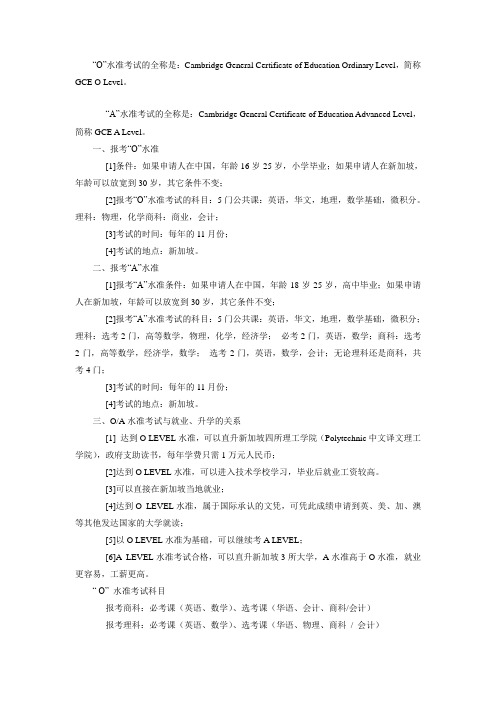
“O”水准考试的全称是:Cambridge General Certificate of Education Ordinary Level,简称GCE O Level。
“A”水准考试的全称是:Cambridge General Certificate of Education Advanced Level,简称GCE A Level。
一、报考“O”水准[1]条件:如果申请人在中国,年龄16岁-25岁,小学毕业;如果申请人在新加坡,年龄可以放宽到30岁,其它条件不变;[2]报考“O”水准考试的科目:5门公共课:英语,华文,地理,数学基础,微积分。
理科:物理,化学商科:商业,会计;[3]考试的时间:每年的11月份;[4]考试的地点:新加坡。
二、报考“A”水准[1]报考“A”水准条件:如果申请人在中国,年龄18岁-25岁,高中毕业;如果申请人在新加坡,年龄可以放宽到30岁,其它条件不变;[2]报考“A”水准考试的科目:5门公共课:英语,华文,地理,数学基础,微积分;理科:选考2门,高等数学,物理,化学,经济学;必考2门,英语,数学;商科:选考2门,高等数学,经济学,数学;选考2门,英语,数学,会计;无论理科还是商科,共考4门;[3]考试的时间:每年的11月份;[4]考试的地点:新加坡。
三、O/A水准考试与就业、升学的关系[1] 达到O LEVEL水准,可以直升新加坡四所理工学院(Polytechnic中文译文理工学院),政府支助读书,每年学费只需1万元人民币;[2]达到O LEVEL水准,可以进入技术学校学习,毕业后就业工资较高。
[3]可以直接在新加坡当地就业;[4]达到O LEVEL水准,属于国际承认的文凭,可凭此成绩申请到英、美、加、澳等其他发达国家的大学就读;[5]以O LEVEL水准为基础,可以继续考A LEVEL;[6]A LEVEL水准考试合格,可以直升新加坡3所大学,A水准高于O水准,就业更容易,工薪更高。
人教英语八年级上册 UNIT1Section A1a2d(共19张PPT)

1.Where did you go on vacation? 你去哪儿度假? go on vacation 意为“去度假”。
2. I went to summer camp. 我去了夏令营。 go to summer camp 意为“去夏令营”。 类似的短语还有: 1.go to the mountains 去爬山 2.go to the beach 去海滩 3.go to the movies 去看电影 4.go to the party 去参加聚会 5.go to work 去上班
( B ) 2.They helped me ___ my books.
A. finds B. to find C. found D. finding
( A ) 3. What ___ you ___yesterday?
A. did, do B. do, do C. did, doing D. are, do
( C ) 4. ---Where did she go on vacation?
---She ___ to the beach.
A. go
B. goes
C. went D. going
( C ) 5.Everyone____a good time!
A.had B. have
C.has
D.having
anyone 表示“某人”时,常用于否定句和疑问句中,意为 “什么人,谁”;表示 “任何人”,可用于肯定句。被形容词 修饰时,形容词应该置于其后。
2. anywhere 的用法
1) 我在什么地方都不能找到它。I can't find it anywhere. 2) 昨晚你去什么地方了吗? Did you go anywhere last night? 3) 你去过又去的地方吗? Did you go to anywhere interesting? 4) 随便坐。 Sit anywhere.
(完整版)全国英语等级考试一级真题
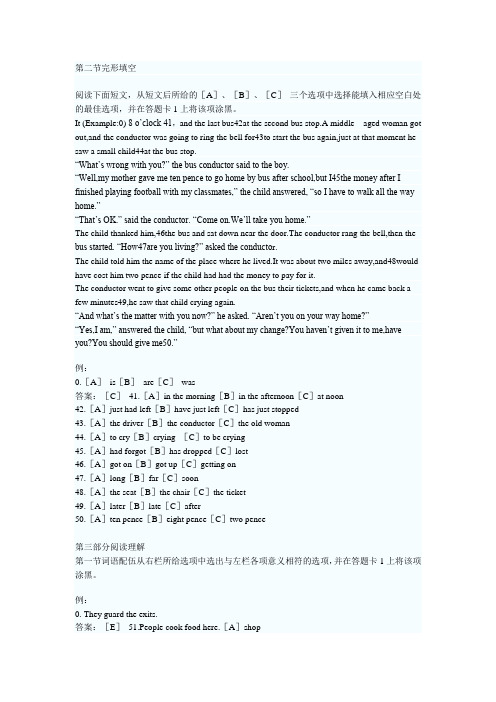
第二节完形填空阅读下面短文,从短文后所给的[A]、[B]、[C]三个选项中选择能填入相应空白处的最佳选项,并在答题卡1上将该项涂黑。
It (Example:0) 8 o’clock 41,and the last bus42at the second bus stop.A middle aged woman got out,and the conductor was going to ring the bell for43to start the bus again,just at that moment he saw a small child44at the bus stop.“What’s wrong with you?” the bus conductor said to the boy.“Well,my mother gave me ten pence to go home by bus after school,but I45the money after I finished playing football with my classmates,” the child answered, “so I have to walk all the way home.”“That’s OK.” said the conductor. “Come on.We’ll take you home.”The child thanked him,46the bus and sat down near the door.The conductor rang the bell,then the bus started. “How47are you living?” asked the conducto r.The child told him the name of the place where he lived.It was about two miles away,and48would have cost him two pence if the child had had the money to pay for it.The conductor went to give some other people on the bus their tickets,and when he came back a few minutes49,he saw that child crying again.“And what’s the matter with you now?” he asked. “Aren’t you on your way home?”“Yes,I am,” answered the child, “but what about my change?You haven’t given it to me,have you?You should give me50.”例:0.[A]is[B]are[C]was答案:[C]41.[A]in the morning[B]in the afternoon[C]at noon42.[A]just had left[B]have just left[C]has just stopped43.[A]the driver[B]the conductor[C]the old woman44.[A]to cry[B]crying [C]to be crying45.[A]had forgot[B]has dropped[C]lost46.[A]got on[B]got up[C]getting on47.[A]long[B]far[C]soon48.[A]the seat[B]the chair[C]the ticket49.[A]later[B]late[C]after50.[A]ten pence[B]eight pence[C]two pence第三部分阅读理解第一节词语配伍从右栏所给选项中选出与左栏各项意义相符的选项,并在答题卡1上将该项涂黑。
高考英语3500词分单元检测-Unit-1--a(an)--action(附答案)
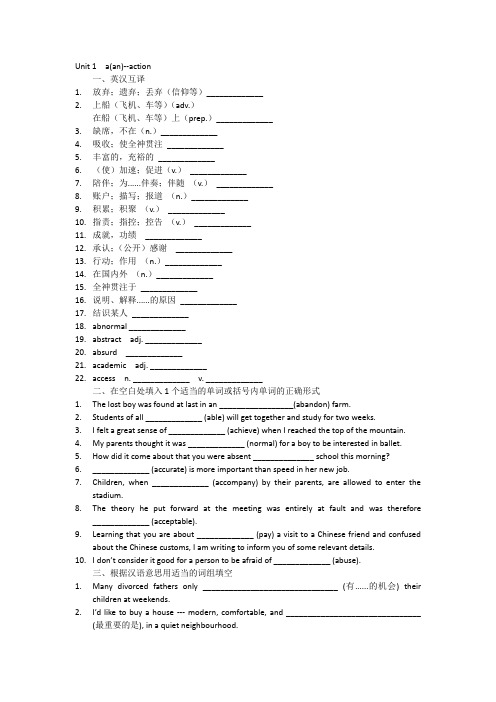
Unit 1 a(an)--action一、英汉互译1.放弃;遗弃;丢弃(信仰等)_____________2.上船(飞机、车等)(adv.)在船(飞机、车等)上(prep.)_____________3.缺席,不在(n.)_____________4.吸收;使全神贯注_____________5.丰富的,充裕的_____________6.(使)加速;促进(v.)_____________7.陪伴;为......伴奏;伴随(v.)_____________8.账户;描写;报道(n.)_____________9.积累;积聚(v.)_____________10.指责;指控;控告(v.)_____________11.成就,功绩_____________12.承认;(公开)感谢_____________13.行动;作用(n.)_____________14.在国内外(n.)_____________15.全神贯注于_____________16.说明、解释......的原因_____________17.结识某人_____________18.abnormal _____________19.abstract adj. _____________20.absurd _____________21.academic adj. _____________22.access n. _____________ v. _____________二、在空白处填入1个适当的单词或括号内单词的正确形式1.The lost boy was found at last in an _________________(abandon) farm.2.Students of all _____________ (able) will get together and study for two weeks.3.I felt a great sense of _____________ (achieve) when I reached the top of the mountain.4.My parents thought it was _____________ (normal) for a boy to be interested in ballet.5.How did it come about that you were absent ______________ school this morning?6._____________ (accurate) is more important than speed in her new job.7.Children, when _____________ (accompany) by their parents, are allowed to enter thestadium.8.The theory he put forward at the meeting was entirely at fault and was therefore_____________ (acceptable).9.Learning that you are about _____________ (pay) a visit to a Chinese friend and confusedabout the Chinese customs, I am writing to inform you of some relevant details.10.I don’t consider it good for a person to be afraid of _____________ (abuse).三、根据汉语意思用适当的词组填空1.Many divorced fathers only _______________________________ (有......的机会) theirchildren at weekends.2.I’d like to buy a house --- modern, comfortable, and _______________________________(最重要的是), in a quiet neighbourhood.3.Tom _______________________________ (全神贯注于) playing the piano and didn’tnotice my coming.4.It is said that body language _______________________________ (占据比例) 55 percent ofa first impression while what you says just 7 percent.5.I found her letter _______________________________ (偶然) as I was looking throughmy files.6.The government must _______________________________ (采取行动) now to stop therise in violent crime.ually they _______________________________ (习惯于) not talking at meals.8.The professor ____________ (already) ____________________________ (被控告) stealinghis students’ ideas and publishing them.四、句型转换1.The case was dismissed for lack of any definite proof.The case was dismissed _________ _________ _________ _________ any definite proof. 2.She acknowledged that she was defeated.She acknowledged that _________ _________ _________.3.Jack was so absorbed in painting that he didn’t notice evening approaching.So absorbed _________ _________ _________ _________ that he didn’t notice evening approaching.4.If you take inflation (通货膨胀) into consideration, we actually spend less now.Inflation _________ _________ _________ , we actually spend less now.5.This machine isn’t working. Have you called the technician to make some adjustments?This machine isn’t _________ _________. Have you called the technician to make some adjustments?五、根据提示翻译句子1.他能说一口流利的英语。
《英语(第一册)》(中专英语)教学大纲教材:英语(第一册)主编

《英语(第一册)》(中专英语)教学大纲教材:英语(第一册)主编英语(第一册)赵俊峰郝晶中国人民大学出版社:100学时服装设计,国际服装设计,服装工程,服装营销:服设系,国设系,服工系,服营系 Unit 1Speaking: How are you doing?Reading: Text A Greetings and PartingsWriting: How to write a thanks letterReading: Text B Greetings in different countriesSummary: Be and personal pronouns Unit 2Speaking: Tell me about your familyReading: Text A The old daysWriting: Write about your familyReading: Text B Lucky dadSummary: Countable and uncountable nouns/adjectivesUnit 3Speaking: Department storesReading: Text A How did restaurant start?Writing: Write an interviewReading: Text B Shopping at a department storeSummary: There be/articlesUnit 4Speaking: What supplies do you think you need?Reading: Text A Going to school in EnglandWriting: Complete the tableReading: Text B Working and swimmingSummary: The present simple tense Unit 5Speaking: I need to buy a present for my mother’s birthday Reading: Text A That’s interestingWriting: Rewrite the paragraphReading: Text B A good-bye presentSummary: Zero articlesUnit 6Speaking: Where are you from?Reading: Text A No home in AfricaWriting: Why do I like my hometown?Reading: Text B The longest raceSummary: The simple past tense/Used toUnit 7Speaking: Which day is Thanksgiving day?Reading: Text A New Year’s customsWriting: Describing a special foodReading: Text B Greetings around the worldSummary: Dates/NumeralsUnit 8Speaking: Do you like music?Reading: Text A HobbiesWriting: Favorite hobbyReading: Text B Reading good booksSummary: Special questionsUnit 9Speaking: What’s on?Reading: Text A Sold out!Writing: The film or actor I like bestReading: Text B The actorSummary: Modal verbs/Have toUnit 10Speaking: Where are you going to spend your holiday?Reading: Text A Spring festivalWriting: Your plan for this summer holidayReading: Text B American festivalsSummary: Future tense/Be going to“五年制高等职业教育英语课程”符合《五年制高等职业教育实用英语课程基本要求》和《普通高等专科学校英语课程基本要求》。
人教英语七年级上册Unit2SectionA1a2d
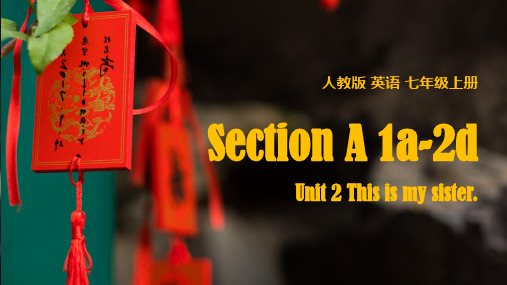
Pre-listening parent
father or mother 父(母)亲
parents
father and mother 父母
Pre-listening grandparent
grandfather or grandmother
祖父(母);外祖父(母)
grandparents
grandfather and grandmother
Pre-listening
Look at the picture. Let’s meet Cindy’s family.
Can you guess who they are?
father mother
grandfather
grandmother
This is Cindy.
sister brother
Li Lan: Cindy, is this your family photo? Cindy: Yes, it is, Li Lan. Li Lan: Are these your parents? Cindy: Yes, they are. This is my mother, Jenny, and this is my father, Tom. Li Lan: Oh, who’s she? Cindy: She’s my sister, Mary. Li Lan: Who’re they? Cindy: They’re my grandparents, Linda and Bob. Li Lan: And who’s he? Cindy : He’s my brother, Jack.
【图解助记】 family=father and mother I love you
英语水平等级对照表
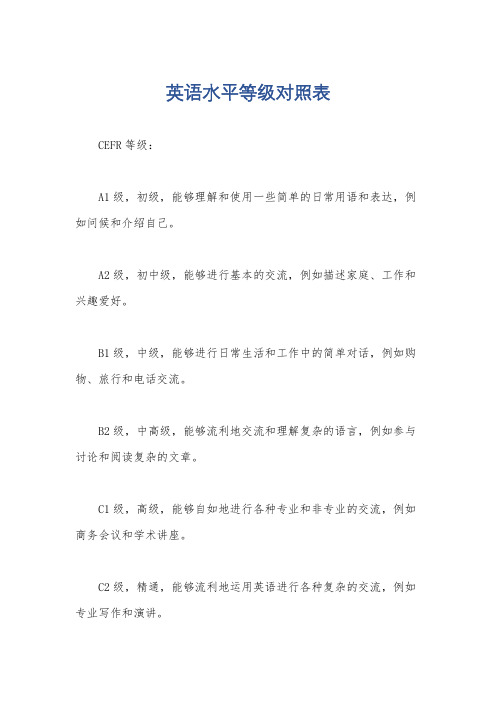
英语水平等级对照表
CEFR等级:
A1级,初级,能够理解和使用一些简单的日常用语和表达,例如问候和介绍自己。
A2级,初中级,能够进行基本的交流,例如描述家庭、工作和兴趣爱好。
B1级,中级,能够进行日常生活和工作中的简单对话,例如购物、旅行和电话交流。
B2级,中高级,能够流利地交流和理解复杂的语言,例如参与讨论和阅读复杂的文章。
C1级,高级,能够自如地进行各种专业和非专业的交流,例如商务会议和学术讲座。
C2级,精通,能够流利地运用英语进行各种复杂的交流,例如专业写作和演讲。
ACTFL等级:
Novice(初学者),具备基本的词汇和语法知识,能够进行简
单的日常交流。
Intermediate(中级),能够进行更复杂的对话,理解并表达
更多的细节。
Advanced(高级),能够处理更加复杂的语言任务,例如参与
辩论和解释复杂的观点。
Superior(优秀),能够流利地进行各种专业和非专业的交流,并理解各种文化背景下的语言使用。
Distinguished(卓越),具备接近或达到母语水平的语言能力,能够进行高度专业化的交流。
需要注意的是,这些等级只是一种参考,实际的英语水平还需
要综合考虑词汇量、语法能力、听说读写等方面的表现。
此外,不
同的语言考试机构和教育机构可能有不同的等级划分标准,因此具
体的等级对照可能会有所差异。
(1A-6A)英语单词

A(a) & 人名# 地名1A2Aaction 2/8 n. 行动 a few 5/18 几个age 1/2 n. 年龄 a pair of 7/27 一双;一副along 6/22 prep. 沿着;顺着;向前able 3/10 adj. 能干的& Amy 4/16 n. 艾美(女名)across 8/32angry 3/11 adj. 生气afraid 2/7 adj. 害怕;担心be angry with 对…生气# Africa 2/6 n. 非洲& Annie 1/1 n. 安妮again 1/1 adv. 再一次another 6/22 det.,pron. 另一个ago 5/17 adv. 年龄April 5/17 n. 四月air 3/11 n. 空气;气appetite 2/5 n. 胃口;食欲airport 8/32# Aranda 1/4 n. 阿兰大alone 6/21 adj. 单独的at the beginning of 5/20 在…的开头# Amazon River 3/9 n. 亚马逊河At end of 5/20 在…的结尾angrily 3/10 adv. 愤怒的;生气的# Auckland 1/1 n. 奥克兰(地名)answer 3/9 v. & n. 回答;答复;回复August 5/17 n. 八月anything 2/5 pron. 任何东西autumn 7/26 n. 秋天arm 7/25 n. 手臂;胳臂arrive 7/26 v.到达as 2/5 conj. & adv. 像…一样;如同as … as 2/5 像;如同as usual 5/18 和往常一样asleep 4/14 adj. 睡着的at night 3/12 ; 5/18 在晚上a (year) or two 6/24 约一两(年)awake 4/14 adj. 醒着3A 4Aa bit 6/21 一点 a number of 5/18 一些a few 4/13 adj. 几个accident 4/15 n. 事故;意外的事A.D. 6/24 n. 公元& Adams 7/27 n. 亚当斯(姓)afraid 2/7 adj. 害怕的;担心adopt 8/32 v. 收养agent 4/14 n. 代理商;代理人adult 8/31 n. 成年人all over the word 8/29 全世界again and again 2/8 反复地;再三地all the time 1/4 一直;始终although/though 6/21 conj. 尽管;虽然already 4/14 adv. 已经American Buffalo 8/30 n. 野牛And the same to you! 8/31 你也一样!& Anna 7/27 n. 安娜(女名)& Ann 1/4 n. 安(女名)ant 3/12 n. 蚂蚁anybody 2/6 pron. 任何人& Antoni 2/6 n. 安东尼(男名)anyone 2/7 pron. 任何人as 8/30 conj. 因为;由于anywhere 2/5 adv. 任何地方# Asia 6/24 n. 亚洲as soon as 2/5 一……就at first 8/29 起先;开始的时候ask for 8/32 请求;向……要at last 5/17 最后;终于at the end 2/5 最后;尽头at once 2/6 立刻;马上at the moment 7/25 在这一刻at the moment 7/255A 6AA great deal (of) 4/13 很多;大量的 a set of 1/2 一套above 7/26 prep. 在…上面;在…以上across the road 3/9 在路的对面across 2/8 ; 6/22 prep. 从一边到另一边;横过& Agnes 4/16 n.阿格尼丝(女名)actually 1/4 adv. 事实上;实际上;其实agree to (do sth.) 2/5 同意(做某事)add 3/12 v. 添加# Alberta 3/12 n. 阿尔伯达(加拿大省名)advantage 1/1 n. 优点;好处& Ali 5/17 阿力advice 5/20 n. 忠告all the time 1/1 一直;始终aeroplane 7/28 (=plane) n. 飞机along (with sb./sth.) 1/1 随同;陪同;一同agree with (sb.) 2/6 赞成(某人)的意见along / on the way 4/13 在途中;在路上agree 2/6 v. 同意;赞成;应允ambulance 1/4 n. 救护车& Alexander Graham Bell 2/7 among 2/5 prep.(三者或三者以上)之间亚历山大•格雷厄姆•比尔allow 5/17 v. 允许;准许and so on 2/5 等等almost 2/5 adv. 几乎;差不多around 2/7 prep. & adv. 到处;在周围alphabet 4/16 n. 字母表as well as 3/12 即…也;不仅…而且American Indian 2/8 n. 印地安人at the same time 3/10 同时ancient 2/8 adj. 古代的;古老的answer (the phone) 2/7 v. 接(电话)army 4/13 军队as 4/14 作为;当作as well as 7/28 也# Asia 7/28 亚洲ask 3/11 邀请at least 2/6 至少;起码at the age of(…)2/6 在(…)岁时Auntie 5/17 阿姨B(b)1A 2Aback 6/21 adj. 后面back 6/24 ; 7/25 n. 背;背后;后背badly 3/11 adv. 不好bamboo 2/7 n.竹子bank 6/22 n. 银行(be) able to 3/10 能够(有能力)做某事be late for 2/5 …迟到(be) afraid of 2/7 害怕;担心& Becker 1/3 n. 百卡(be) bad at 1/2 在……(方面)差become 1/1 v. 变成(be) born 5/17 出生于before 2/5 prep. 在…以前(be) different form 1/1 与……不同beginning 1/1 n. 开始(be) ready to / for 4/14 为……准备好# Berlin 1/1 n. 柏林(地名)bear 2/7 n. 熊best3/11 adj. 最好的because 3/11 adj. 因为Best wishes 8/32 最诚挚的祝愿bee 7/27 n. 蜜蜂biology 3/10 n. 生物before 1/1 ; 5/18 adv.以前conj.在…之前blow 7/25 v. 吹better 1/2 adj. & adv. & n. 更好(的/地)bowl 2/5 n. 碗bite 2/5 v. 咬bring 8/29 v. 带来;拿来Book of Lists 3/9 n. 世界之最brush 2/5 v. 刷brave 5/18 adj. 勇敢building 1/2 n. 大楼;建筑物bright 4/15 adj. 明亮的brightly 3/11 adv. 明亮地& British 1/2 adj. 英国(人)的brother-in-law 4/15 姐夫;妹夫;大伯;小叔build 8/31 v.(pt.built) 建筑;造bus-driver 7/28 n. 公共汽车司机3A 4Abadminton 2/5 n. 羽毛球& Ball 7/27 n. 鲍尔(姓)be excited about 6/21 对…感到很担忧# Bangkok 6/24 n. 曼谷(泰国的首都)be famous for 3/12 因…而著名baseball 6/24 n. 棒球(be) good for 3/12 对…有好处 B.C 5/17 公元前be in trouble 1/1 有麻烦Be careful ! 4/14 小心!be worried about 6/21 对…感到很担忧& Beckham 1/4 n. 贝克汉姆(姓)been 4/13 v.(am/are/is的过去分词)是;成为billions of 1/2 数以亿计的begun 5/17 v. (begin的过去分词)开始break 2/6 (pt. broke, pp.broken)v.& n. 折短;打破;打碎believe 2/6 v. 相信;认为broken 2/5bell 1/1 n. 钟;铃by 8/30 prep. 到……为止Best wishes 7/25 最诚挚的祝福billion 6/23 num. 十亿bitten 7/27 v.(bite的过去分词)咬& Bob 1/2 n. 鲍勃(男名)body 5/18 n. 身体;躯体bottom 7/26 n. 底;底部bought 4/14 v.(buy的过去分词)买bridge 4/14 n. 桥built 4/16 v.(build的过去分词)5A 6A# Bali 7/28 芭厘岛bandage 1/4 n. 绷带be interested in 1/1 对…感兴趣be poor at 2/8 不擅于be off 7/28 出发beat 1/2 (pt. beat, pp. beaten) v. 打败;打beach 7/25 n. 海滩bone 2/7 n. 骨头beak 2/8 n. 鸟嘴bright 2/8 adj. 聪颖的;伶俐的beef 7/26 n. 牛肉believe in 6/23 相信;信任below 7/26 prep. 在…上面;在…以上& Betsy 7/28 贝琪(女名)bicycle 5/17 (=bike) n. 自行车;脚踏车bill 4/14 n. 帐单;清单blind 5/18 ; 4/16 adj. 瞎的boil 3/12 v. 煮沸bone 2/8 n. 骨头brain 1/4 n. 脑(子)bride 8/32 n. 新娘builder 1/4 n. 建筑工人burn 8/29 (pt.,pp.burned or burnt) v. 烧;烧焦business 1/1 n. 商业;生意;营业by 7/27 ; 3/10 prep. 在…旁;靠近;被by mistake 5/18 由疏忽所致by the time 4/13 到…的时候C(c)1A 2Acamera 8/29 n. 照相机call 3/9 v. 叫做# Canberra 1/4 n. 堪培拉(澳大利亚)change 4/16 v. 变card 5/18 n. 卡片chocolate 6/22 n. 巧克力change 4/13 n. 零钱Christmas 5/19 n. 圣诞节cheap 4/13 adj. 便宜Christmas Day 5/19 圣诞节Children’s Day 5/19 儿童节cinema 5/17 n. 电影院class teacher 1/1 n.班主任clever 1/2 adj. 聪明的;机灵的cloud 7/25 n. 云close (to) 3/10 adj. 靠近的adv. 紧紧(地)cloudy 7/25 adj. 多云的come out 3/10 出来cold 7/25 adj. 冷的conductor 4/15 列车员come to 4/13 合计correct 1/4 adj. 对的;正确& Cook 6/22 n. 库cousin 2/5cool 7/25 adj. 凉的crocodile 2/7 n. 鳄鱼cost 4/13 v. 花费;值(多少)钱cross 5/18 v. 穿过;越过;渡过countryside 8/29 n. 乡村cover 7/27 v. 覆盖cut 8/31 v. 割;切3A 4A# Canton 4/16 n. 广州cable 6/24 car n. 缆车capital 4/14 n. 首都;省会# California 6/24 n. 加carrot 8/30 n. 胡萝卜call (sb.) (on the phone) 6/21 v. 打电话(给…)centre 4/14 n. 中心;中央(phone) call n. 6/21 电话change 6/24 v. 改变careful 4/14 adj. 细心的;小心& Charles 4/16 n. 查尔斯(男名)carry on 4/15 继续下去;继续开展Children’s Palace 1/1 n. 少年宫catch 2/7 赶上;(车辆)chilli 3/10 n.(pl.chillies) 红辣椒catch a (bad) cold 2/5 患(重)感冒;着凉chimney 8/29 n. 烟囱catch a bus 2/7赶上公共汽车# Chinatown 4/14 唐人街& Celine Dion 1/4 n. 席琳•迪昂(女名)choose 7/28 v. 选择change 1/2 v. 改变;更换;n. 变化chopstick 3/10 n. (常用复数)筷子cheetah 7/27 n. 猎豹Christmas Eve 8/29 圣诞老人coal 3/11 n. 煤cities (pl.)1/2 n. 城市coffee 8/31 n. 咖啡coke 3/9 n. 可口可乐cold 1/2 n. 寒冷(的天气)competition 2/6 n. 比赛;竞赛(the) cold (n.)2/5 congratulations 2/6 n. 祝贺;庆贺collect 1/1cook 3/10 n. 厨师;炊事员come back 2/7 回来copy out 5/18 抄写corner 8/29 n. 角落;角;拐角copy 5/18 v. 抄写cough 2/5 n. & v. 咳嗽count up to 6/23 数到crack 2/8 n. 霹啪(爆裂的声音)crag 4/14 n. 岩& Crocodile Dundee 6/22 n. 鳄鱼•登迪先生(人名)crash 7/27 v. 碰撞;坠落cry 8/29 v. & n. 喊叫(声);哭(声)cut (…) off 5/18 (把…)切下;割下cut down 5/20 砍倒5A 6Acabbage 8/31 n. 洋白菜calendar 2/5 n. 日历;月历can 6/22 v. aux. 可能call for (sb./sth.) 1/2 呼唤;叫(某人或物)来# Canton 2/5 n. 广州cap 3/10 n. 便帽;无边帽& Carrie 5/20 卡丽(女名)car parts 4/16 汽车零件celebrate 8/29 v. 庆祝;庆贺carry 1/2 v. 抬走change (sb’s) mind5/17 改变(某人)的想法cent 3/11 n. 分& Charles Dickens 4/14 Central Post Office 6/24查理• 狄更斯(英国小说家)n. 中央邮局chemistry 6/22 n. 化学clear 2/5 adj. 清楚的;清晰的;明亮的choice 5/17 n. 选择club 6/23 n. 俱乐部choose 3/9 (pt. chosen) v. 挑选copy 3/12 n. 复制品church 8/32 n. 教堂correct 8/31 adj. 正确的cloth 8/32 n. & adj. 布cotton 2/7 n. 棉花;棉线;棉布coloured 6/22 adj. 彩色的course 3/12 n. 球场;场地colourful 7/25 adj. 颜色丰富的cross 3/10 n. 十字型(的东西)comfortable 6/21 adj. 舒服的common 5/20 ; 6/21 adj. 普通的compare (with/to) 5/17 v. 比较;对照complete 4/13 v. 完成Confuciusornis 2/8 n. 始祖鸟cotton 8/32 n. & adj. 棉D(d)1A 2Adate 5/17 n. 日期dance 7/26 v. & n. 跳舞December 5/17 n. 十二月dangerous 2/5 adj. 危险的degree 8/30 n. 度数dark 5/18 ; 7/27 adj. 深色的;(头发,皮肤等)黑色的n.黑暗(的);暗处℃7/28 (读作degrees centigrade) day 3/12department store 6/22 n. 百货商店dead 4/15 adj. 死的;无生命的difference 4/15 n. 不同decide 6/22 v. 决定divided by 4/13 除以deep 3/9 adj. & adv. 深的(地);深厚的dollars 3/15 n. 元(货币)diary 8/29 n. 日记;日记簿do morning exercises 2/6 做早操did 4/14 v.(do的过去式)dormitory 6/23 n. 宿舍die 4/15 v. 死drink 8/29 n. 饮料difficult 2/6 adj. 困难的;艰难的dry 7/25 adj. 干的;干燥的doll 7/28drive 8/30 v.(pt.drove) 开车;驾驶3A 4Adancer 1/2 n. 舞蹈家danger 8/29 n. 危险& David 1/2 n. 大卫(姓或男名)dark 6/24 n. 黄昏;傍晚delicious 3/9 adj. 美味的;可口的day after day 4/14 一天又一天destroy 6/24 v. 破坏dig 4/16 v. 挖;掘dictionary 5/17 n. 字典;辞典Dr=Doctor 2/5 医生dirty 1/2 adj. 脏的draw 1/3 v. 画;绘制do with 5/20 处理drop 5/17 v.(使)落下;掉下do your best 7/26 尽力done 4/14 v.(do的过去分词)做(事);干double 6/22 adj. & n. 两倍(的);双的dragon 3/12 n. 龙Dragon’s well 3/12 龙井driver 1/3 n. 司机dumpling 3/12 n. 饺子during 7/25 prep. 在…期间;在…过程中5A 6Adeaf 2/7 adj. 聋的danger 3/11 n. 危险destroy 3/12 v. 破坏dear 3/9 adj. 贵的dining room 3/12 n. 餐室(厅)department 6/21 n. 部门dinosaur 2/8 n. 恐龙direction 4/14 n. 方向;方位disadvantage 1/1 n. 不利条件;弱点dirt 2/8 n. 泥土discover 6/22 v. 发现dish 7/26 n. 盘;碟discuss 5/17 v. 讨论;议论downstairs 3/9 adv. & adj. 在楼下dish 8/31 n. 饭菜& Dr Norman Bethune 1/4 白求恩大夫dot 4/16 n. 点dream home 4/16 理想居所Dr 2/8 n. 博士(称号)drive 7/25 n. 驾驶路程Dragon Boat Festival 8/31 端午节drop 8/32 n. 滴dragon 7/25 n. 龙dream 6/21 (pt., pp. dreamed or dreamt) v. & n. 梦;梦想dress 8/29 v. 穿着;穿衣drum 8/30 n. 鼓dumpling 3/11 n. 饺子E(e)1A 2Aearly 1/2 adv. 早Earth ; the earth 3/11 n. 地球& Eddie 6/21 n. 艾迪(男名)east 8/32 adv. 朝东end 1/1 ; 1/4 n. 结束v. 结束elephant 2/6 n. 大象equals 4/13 等于else 5/17 adv. 别的;其它的exercise 2/6 n. 练习encouragement 1/4 n. 鼓励expensive 3/15 adj. 贵的enough 6/22 adj.,adv. & n. 足够everything 2/5 pron. 每件事;事事(或物)exam 8/30 n. 测验;考试except 5/17 prep. 除……之外except for 5/17 除了3A 4Aeach other 6/21 互相earth 4/16 n. 大地;泥土each 2/5 pron. 每either 3/9 adv. 也(不)eaten 5/18 v.(eat的过去分词)吃enjoy oneself 6/22 过得愉快either 5/20 adj. & pron. 二者之一;entrance 8/31 n. 入口adv.(用于否定句或肯定短语后)也(不)either…or 5/20 或者…或者;不是…不是& Epps 7/25 n. 艾普斯(姓)English – Chinese dictionary 5/17 英汉词典# Europe 6/22 n. 欧洲enjoy 1/1 v. 喜欢even 1/1 adv. 甚至;更加;连…都everybody 2/5 pron. 每人;人人excitedly 5/18 adv. 兴奋地everywhere 2/5 adv. 到处exciting 2/6 adj. 兴奋的excited 6/21 adj. 兴奋的;激昂的excuse 7/26 n. 籍口extra 7/27 adj. 额外的;外加的exit 8/31 n. 出口5A 6Aeat up 3/12 吃完;吃光earache 1/1 n. 耳朵疼# Egypt 4/16 n. 埃及eat up 2/7 吃完;吃光Egyptian 4/16 adj.埃及的;& Edward Leedskalnin 4/16埃及人;埃及语爱德华•利兹考尔林& Eileen 5/20 爱琳(女名)& Einstein 2/8 n. 爱因斯坦(姓)either 5/17 adj. & pron. 二者之一& Emma 4/13 n. 埃玛(女名)adv.(用于否定句或肯定短语后)也(不)either…or 5/17 或者…或者;不是…就是the English Route Army 1/4 八路军e – mail 7/28 n. 电子邮件enjoyable 6/24 adj. 愉快的;有趣的erhu 1/4 n. 二胡event 2/8 n. 事件example 8/29 n. 例子;榜样expert 2/8 n. 专家F(f)1A 2Afall down 7/25 跌倒fail 8/30 v. 失败;不及格far from 1/3 远离;离…很远far away (from) 3/11 遥远的February 5/17 n. 二月farther ; further 2/7 adj.(far的比较级)较远的;更远的feed 2/6 v. 喂养fast 1/3 adj. & adv. 快的(地);迅速的(地)festival 5/19 n. 节日fat 1/1 adj. 肥胖的film 8/29 n. 胶卷father – in – law 4/15 岳父;公公;forget 8/32 v. 忘记(favourite) of all 2/6 最(喜爱)的forward 8/29 adv. 向前;前进female 6/24 n. 女性& Frank 6/21 n. 弗莱克(男名)film 8/29from the lest/right 4/15 由左边(右边)finger 7/25 n. 手指fruit 4/14 n. 水果fire fighter 4/15 消防员full moon 5/19 圆月;满月flour 6/22 n. 面粉forget 2/5 v. 忘记;忘掉funny 1/1 adj. 滑稽可笑的;古怪的3A 4Afall asleep 8/29 睡着了false 6/23 adj. 不正确的;假的fallen 8/29 v.(fall的过去分词)落下famous 6/22 adj. 著名的famous 3/12 adj. 著名的;有名的farm 5/20 v. 务农;从事;农业;养殖farm 6/24 v. 种田;务农& Farr 7/27 n. 法尔(姓)Father Christmas 8/29 圣诞老人fault 7/28 n. 缺点;毛病feel 3/9 v. 感觉feel 2/5 (pt., pp. felt) v. 摸;有…的感觉fill 8/29 v. 满;充满field 4/16 n. 地;田地finish 4/15 v. 完成;做完fight 5/17 (pt., pp. fought) v. 搏斗;打架(仗)fire 8/29 n. 火;火炉;火灾find 3/12 v. 发觉;感到flown 5/18 v.(fly的过去分词)飞Floating Market 6/24 水上市场footballer 1/3 n. 足球运动员flu 2/8 n. 流行性感冒;流感for years 6/21 (过了)许多年follow 5/18 v. 跟随;跟着foreign 1/2 adj. 外国的for example 1/4 例如foreigner 5/17 n. 外国人forest 8/32 n. 森林forgotten 5/17 v.(forget的过去分词) forever (=for ever)8/30 adv. 永远fork 3/10 n. 叉;餐叉free 6/21 adj. 有空的;空闲的;自由的found 4/14 v.(find的过去分词)找到frog 4/13 n. 青蛙& Fran 7/26 n. 弗兰(女名)from morning till night 4/14 从早到晚French fries 3/9 n. 炸薯条from now on 7/26 从此以后;今后# French 5/17 n. 法语from then on 8/29 从那时起fried 3/10 adj. 煎的;炸的fruit 5/17 n. 果实form side to side 5/18 从一边到另一边fun 1/1 n. 有趣的事;玩笑;娱乐5A 6Afavourite 7/25 n. 特别喜爱fan 1/2 n. 热心的追随或支持者;迷fewer 2/6 (few的比较级)更少feel like 8/32 想要(the) fewest 2/6 (few的最高级)最少fine 4/13 adj. 晴朗的field 6/23 n. 地;田地fragile 3/11 adj. 易碎的finally 5/19 adv. 最后;最终find out 5/17 查明;发现;了解fire – fighter 1/2 n. 消防员flag 3/9 n. 旗follow 8/30 v.(在理解上)听得懂;跟得上for example 8/29 比方说fossil 2/8 n. 化石fresh 8/31 adj. 新鲜frighten 8/29 v. 吓唬future 5/17 n. & adj. 将来;未来G(g)1A 2Ageography 3/10 n. 地理gentle 2/5 adj. 驯服的;温柔的# Germany 1/1 n. 德国gently 3/10 adv. 温柔地get 5/20 v. 变得get 3/9 v. 变得;成为get on with …7/25 在…方面的进展情况get on 7/28 上车go climbing 8/31 去爬山giraffe 2/6 n. 长颈鹿go shopping 2/7 去购物;买东西go away 3/10 离开;走开go sightseeing 8/31 去游览go down 3/10 下沉;落下go skiing 7/25 去滑雪go for a walk 4/14 出去散步go straight on / down / along 6/22 一直走go off 7/27 (水、电)停;断掉go swimming 2/7 去游泳go to sleep 3/10 睡着;入睡granddad 2/7 n. 祖父;爷爷;外祖父;外公go up 5/20 上升goal 4/13 n. 入球;球门gold 8/29 adj. 金色;金黄色3A 4A& German 5/17 n. 德语gave 2/5 v. (give的过去时)给glad 4/13 adj. 高兴get back 2/7 回来;取回;返回goat 4/16 n. 山羊get off 5/19 下车gone 6/22 v.(go的过去分词)去get on …4/13 上(车、船等)good luck 2/5好运get ready for 2/7(为…)准备好grow 5/18 ; 5/19 v. 生长;发育;种植give up 1/2 放弃grow up 5/18 成年;长大成人given 2/7 v. (give的过去分词)给grown 6/21 v.(grow的过去分词)成长;发育go back 2/7 回去guitar 1/1 n. 吉他;六弦琴go on 3/10 继续god 5/20 n. 神# Golden Gate Bridge 6/24 金门大桥golf 6/24 n. 高尔夫球(be) good for 3/9 对…有好处government 8/32 n. 政府grasshopper 4/14 n. 蚱蜢ground 3/10 n. 地面;土地;运动场5A 6Agardener 1/3 n. 园丁& George Schaller 2/8 乔治•沙勒get into trouble 5/20 遇到麻烦;出事get on (with sb.) 4/15(与某人)相处得好get sick 6/21 生病grandchild 2/6 n.(外)孙子/ 女giant 2/8 ; 6/22 adj. 巨大的# Gravenhurst 1/4n.(神话中的)巨人n. 格雷文赫斯特(加拿大市镇)giant – sized 7/28 巨大的glass 6/21 n. & adj. 玻璃go (well) together 1/4 相配;相搭配好go well 3/12 过得很好golden 7/28 adj. 金色的grandchild 5/20 n. 孙子;孙女& Greek 2/8 n. 希腊人griffin 2/8 n.(希腊神话)鹰头狮身带有翅膀的怪兽groom 8/32 n. 新郎guess 2/5 v. & n. 猜;猜想;猜测;推测guest 3/10 n. 客人;宾客guide 1/3 n. 向导;导游者gun 6/24 n. 枪H(h)1A 2Ahalf 3/9 n. 半half an hour 4/14& Harris 1/2 n. 哈里斯(男名)hamburger 5/17 n. 汉堡包& Harry 5/17 n. 哈利(男名)happen 7/27 v. 发生Hart 6/23 have to 5/17 不得不;必须hart (play)ing 3/11 head 7/25 n. 头;头部have a picnic 8/29 野餐hit 6/22 v.(pt.hit) 打;打击hear 2/7 v. 听见hot dog 5/17 n. 热狗& Henry 3/12 n. 亨利hurt 5/17 v.(pt.hurt) 使受伤;伤害high school 1/4 中学hold 2/6 v. 拿;抱;握住hope 1/1 v. 希望hot 7/25 adj. 热的How do you do ? 1/3 你好吗?How long …? 7/26 多久…?How often …? 2/7 多久一次hungry 5/18 adj. 饥饿的& Hunter 1/4 n. 亨特(姓)3A 4Ahandbag 7/26 n. 手提包had better (not) 4/14 最好(不)harbour 4/14 n. 港;海港hair 3/12 n.(动、植物的)毛;茸毛Have a nice time/holiday. 8/31 (假期)玩得高兴些啊。
人教英语七年级上册Unit6SectionA1a2d
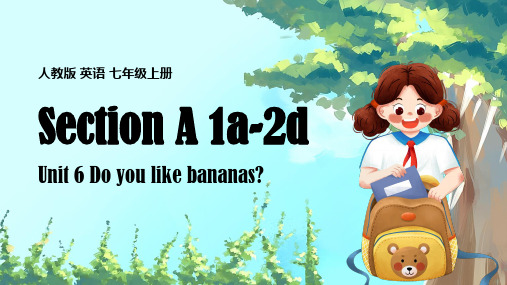
Pre-listening
1a Match the words with the things in the picture.
1. hamburgers _d__
ad e g
2. tomatoes __i_ 3. oranges __f _ i 4. ice-cream _h__
h
5. saladБайду номын сангаас__b_
Post-listening
1c Practice the conversations with your partner. Then make your own conversations.
2 A: Do you like salad? B: No, I don’t.
1 A: Do you like bananas? B: Yes, I do.
—Do you like bananas? —Yes, I do. —Do you like salad? —No, I don’t. —Do you like oranges? —Yes, I do.
While-listening
1b Listen and number the conversations [1-3].
以元音字母+y结尾的可数名词变复数,直接在词尾加-s。
library - libraries(复数) dictionary - dictionaries(复数)
boy - boys(复数)
toy - toys(复数)
Pre-listening
Language points
3. ice-cream (教材P31 1a)
如果喜欢就打√,不喜欢就打×。
Name hamburger tomatoe oranges ice-
大学英语 A2
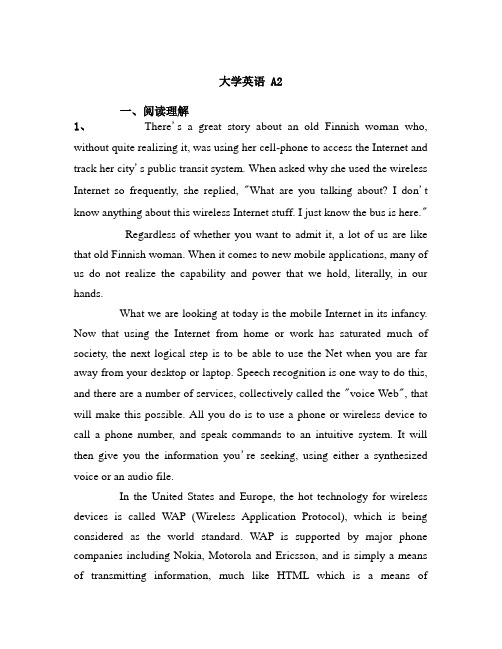
大学英语 A2一、阅读理解1、There's a great story about an old Finnish woman who, without quite realizing it, was using her cell-phone to access the Internet and track her city's public transit system. When asked why she used the wireless Internet so frequently, she replied, "What are you talking about? I don't know anything about this wireless Internet stuff. I just know the bus is here."Regardless of whether you want to admit it, a lot of us are like that old Finnish woman. When it comes to new mobile applications, many of us do not realize the capability and power that we hold, literally, in our hands.What we are looking at today is the mobile Internet in its infancy. Now that using the Internet from home or work has saturated much of society, the next logical step is to be able to use the Net when you are far away from your desktop or laptop. Speech recognition is one way to do this, and there are a number of services, collectively called the "voice Web", that will make this possible. All you do is to use a phone or wireless device to call a phone number, and speak commands to an intuitive system. It will then give you the information you're seeking, using either a synthesized voice or an audio file.In the United States and Europe, the hot technology for wireless devices is called WAP (Wireless Application Protocol), which is being considered as the world standard. WAP is supported by major phone companies including Nokia, Motorola and Ericsson, and is simply a means of transmitting information, much like HTML which is a means ofcommunicating on the Internet.Currently, wireless Internet connections may give you news, sports scores, stock quotes, and the weather if you're lucky. But if you've ever used this technology, you know it's slow, costly and doesn't seem worth the time and effort, if it works at all. All of this technology points to easier living. Perhaps you'll need to find a restaurant for an occasional business meeting. Y ou'll press a button on your mobile phone, and access the Internet to pull up a list of great restaurants in your immediate area. Y ou'll hit another button, say a few words into the handset and you've got a reservation for four.(1)、The author uses the story of an old Finnish woman to indicate that __________.A:she is ignorant of some common knowledgeB:public transit system contains the accessory to Internet C:many people are unaware of the function of the new appliances being usedD:the Internet is experiencing rapid growth答案: C(2)、The word "saturate" (Para. 3) most probably means _________. A:stateB:utilizeC:despiseD:fill答案: D(3)、According to the text, WAP is a __________.A:technology standard set by major phone companiesB:substitution of HTML which can be applied on the Internet C:means of exchanging informationD:a software application for transmitting voice over telephone lines答案: C(4)、We can infer from the passage that the mobile Internet is different from the previous Internet in that the former__________.A:can be accessed by desktop computersB:has no need for wire appliancesC:can be used to book a table in a restaurantD:is equipped with speech recognition systems答案: B(5)、What is the attitude of the author towards the future of mobile Internet?A:IndifferentB:NeutralC:OptimisticD:Pessimistic答案: C2、Castles were brought to Britain by William the Conqueror, when he invaded England in 1066 from his homeland in France. One of the most powerful ways for William to take control of his new kingdom, which included England, Scotland and Wales, was to have castles built throughout the land. At first, he ordered the construction of very simple castles, called motte and bailey castles.These early castles consisted of an earthen mound, topped by a tower built of wood. The bailey was a large area of land enclosed by a shorter fence. Inside the bailey were the main activities of the castle, such as workshops, stables and livestock, household activities, etc., while the tower on the motte was used as the lord's residence and as an observation post. Before long, the earthen castles were replaced by the stone castles, which were much sturdier, did not rot like wood, and also were much more able to withstand any attack by an invader.From the 11th to 13th centuries the stone castles were booming. Theywere not just used by the king. Most castles, in fact, were granted by a king to their most loyal knights or barons who fought bravely in battle and supported their king. The king, starting with William the Conqueror, gave his loyal knights vast estates and permission to build castles. In return, he expected these men to control their lands as the king's representative, to keep the local population from rebelling, and to force them to work and pay rent to the lord, who then passed it onto the king. These knights and barons built castles almost everywhere in Britain, served to strike fear into the local peoples, and to symbolize their power and wealth.By the 15th century the stone castles began declining. For the one thing, military necessity changed in Great Britain. There was less emphasis placed on defense and more on comfort. Earlier stone houses were gradually modified, or abandoned completely and replaced by great houses of a richer and more relaxed style. The development of firearms and the increasing use of gunpowder, for the other one, also ended the castles' endurance.Despite their decline, many wealthy families of the 18th and 19th centuries fed their passions by naming their newly built houses, "castle." This ill-informed romanticism had its valuable side, which eventually led to concerted efforts to preserve and restore many ruined castles.Even today, centuries after they were active in British history, the castles of Britain have established themselves firmly in the national and international mindset. Castles have demonstrated not only the exchanges of the majesty, power and wealth of their noble builders, but also the rise and set of British Empire.(1)、The castles originated from_______.A:FranceB:EnglandC:ScotlandD:Wales答案: A(2)、According to the text, "motte"(Para. 1)refers to _____. A:an earthen moundB:a wooden towerC:a shorter fenceD:a larger area答案: A(3)、From the 11th to 13th centuries, castles were booming because of the following reasons EXCEPT ________.A:a giftB:a force meansC:a symbolD:a tourist attraction答案: D(4)、What caused the decline of the castles?A:They are too expensive.B:They are ruined because of fighting.C:They are less comfortable.D:It took much time to build them.答案: C(5)、Which of the following is true?A:People doesn't like the castles any more.B:Much more new castles are being built.C:The castles are the most famous buildings in Britain.D:The castles still have their reputation in the world.答案: D二、词汇与语法1、For most people, it takes _______ effort to memorize a long poem.A:to considerB:consideringC:considerableD:considerate答案: C2、_____five hundred people are believed to have drowned.A:As many asB:As much asC:So many asD:So much as答案: A3、The icy conditions made our travel dangerous. So _____going by car we took the underground.A:instead ofB:in addition toC:as well asD:at the cost of答案: A4、He had been having trouble ______a hotel room.A:reservingB:to reserveC:reservedD:reserve答案: A5、Are you certain that this is _____ in his letter?A:grandfather expressedB:what grandfather has expressedC:grandfather has expressedD:which grandfather has expressed答案: B6、I believe you'll get through the tough moment, _____?A:don't IB:won't IC:don't youD:won't you答案: D7、I used to _____TV on weekends, but now I start to do some sports with my friends.A:watchedB:watchC:watchingD:be watched答案: B8、They are willing to care for the _____ and disabled.A:oldestB:elderC:olderD:elderly答案: D9、Maggie ____the floor when she _____the door bell ring.A:was sweeping … heardB:swept … heardC:was sweeping … was hearingD:swept … was hearing答案: A10、I wish you wouldn't spend so much time ____TV.A:to watchB:watchC:watchedD:watching答案: D三、完型填空1、Life involves making decisions and changes. Decisions and changes involve making moves, getting __21__ one position or spot in life to another. An effective move involves planning a route and __22__ to it. Whenever you travel, you have the choice of several routes. Some routes of living are __23__ and helpful. Others are negative, creating depression and despair. Knowing __24__ to re-route yourself from negative outlooks, thoughts, or ideas is __25__ for getting where you want to go in life. It is easy to think negatively about others or about __26__.If you allow these thoughts tocontinue unchecked, they develop into ruts (Note: old habits) of __27__. What should you do then? Well, you can say to yourself "Stop!" and refuse to __28__ or believe those negative things you are saying to yourself. By refusing to let a repeating negative thought lead you to frustration, anger or depression, you avoid __29 __in a rut. Instead of continuing to be worn down by a rutted track of negative and destructive thinking, you can consciously and __30__switch yourself or side-track yourself onto a path of more positive thinking.(1)、A:onB:inC:fromD:at答案: C(2)、A:to keepB:keepsC:keepingD:kept答案: C(3)、A:popularB:possibleC:powerfulD:positive答案: D(4)、A:whatB:howC:whetherD:that答案: BA:crucialB:necessaryC:possibleD:classical答案: A(6)、A:himselfB:themselves C:yourselves D:myself答案: C(7)、A:despairB:desireC:decisionD:desperate答案: A(8)、A:receiveB:acquireC:admitD:accept答案: D(9)、A:to be caught B:be caughtC:being caught D:catching答案: C(10)、A:purposelyB:purposeC:purposingD:purposed四、汉译英(1)、除了价格贵,这套家具还令人满意。
新视野大学英语1(第三版)读写教程课后习题答案
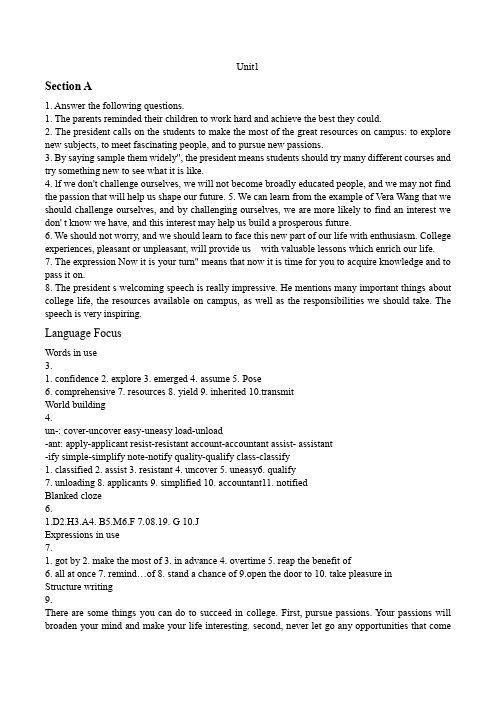
Unit1Section A1. Answer the following questions.1. The parents reminded their children to work hard and achieve the best they could.2. The president calls on the students to make the most of the great resources on campus: to explore new subjects, to meet fascinating people, and to pursue new passions.3. By saying sample them widely", the president means students should try many different courses and try something new to see what it is like.4. lf we don't challenge ourselves, we will not become broadly educated people, and we may not find the passion that will help us shape our future.5. We can learn from the example of Vera Wang that we should challenge ourselves, and by challenging ourselves, we are more likely to find an interest we don' t know we have, and this interest may help us build a prosperous future.6. We should not worry, and we should learn to face this new part of our life with enthusiasm. College experiences, pleasant or unpleasant, will provide us with valuable lessons which enrich our life.7. The expression Now it is your turn" means that now it is time for you to acquire knowledge and to pass it on.8. The president s welcoming speech is really impressive. He mentions many important things about college life, the resources available on campus, as well as the responsibilities we should take. The speech is very inspiring.Language FocusWords in use3.1. confidence2. explore3. emerged4. assume5. Pose6. comprehensive7. resources8. yield9. inherited 10.transmitWorld building4.un-: cover-uncover easy-uneasy load-unload-ant: apply-applicant resist-resistant account-accountant assist- assistant-ify simple-simplify note-notify quality-qualify class-classify1. classified2. assist3. resistant4. uncover5. uneasy6. qualify7. unloading 8. applicants 9. simplified 10. accountant11. notifiedBlanked cloze6.1.D2.H3.A4. B5.M6.F7.08.19. G 10.JExpressions in use7.1. got by2. make the most of3. in advance4. overtime5. reap the benefit of6. all at once7. remind…of8. stand a chance of9.open the door to 10. take pleasure inStructure writing9.There are some things you can do to succeed in college. First, pursue passions. Your passions will broaden your mind and make your life interesting.second, never let go any opportunities that comeyour way. College is full of unique opportunities, which will enable you to sample new things and meet wonderful people. Lastly, take responsibilities. In college you must learn to be responsible for your own decisions. With the passions, the opportunities, and the ability to take responsibilities, you will become successful not only in college, but also in your future career.Translation10.苏格拉底是古希腊哲学家,被誉为现代西方哲学的奠基人。
StarterUnit2SectionB(1a2a)课件人教版英语七年级上册
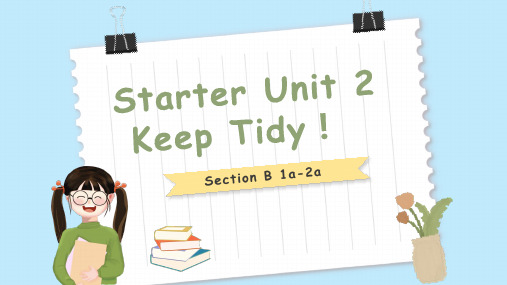
/aɪ/ /θɪŋz/ 1a Let’s help the boy find his things ? preposition (prep.) 地点介词
in on under
on A schoolbag is
the desk.
in Some book are
the box.
A pair of socks is under the bed.
Ella: No, it isn’t.
在这里。
Mum: Oh, here is it. It’s under your desk.
You need to keep your room tidy.’
Ella: OK. Sorry, Mum. 你应该保持房间干净整洁。
Dad: I can’t find my new glasses. Do you see them, Emma? Emma: What colour are they, Dad? Dad: They’ re brown. Emma: 等N会o,儿I。don’t see them... Oh, wait a minute. Now I see them! Dad, they’re on your head! Dad: OK, thank you, Emma! Emma: You’re welcome.
Conversation 2: Dad: I can’t find my new glasses. Do you see them, Emma? Emma: What colour are they , Dad? Dad: They’re brown. Emma: No, I don’t see them...Oh, wait a minute. Now I see them! Dad , they’re on your head! Dad: Oh, thank you, Emma! Emma : You’re welcome.
人教版七年级英语上册Unit1SectionA(1a2e)教学设计

3.学生回答:学生分享自己看到的学校场景和人物,以及自己的学校生活。
4.教师引导:通过学生的回答,自然过渡到本节课的主题——介绍学校和家庭。
3.词汇复习:请同学们制作单词卡片,将本节课所学的核心词汇和短语写在卡片上,包括单词、音标和例句。通过这种方式,学生可以在课后进行词汇复习,加强记忆。
4.家庭作业:完成课后练习册中与本节课相关的一般现在时练习题,巩固语法知识。同时,鼓励学生自主查找资料,了解更多关于一般现在时的用法,提升自主学习能力。
c.对话练习:学生两人一组,用一般现在时进行对话练习,如询问和回答家庭成员的职业。
3.教师指导:教师对学生的练习进行点评,指出错误,解释原因,并提供正确答案。
(五)总结归纳
1.教学内容:对本节课的学习内容进行总结和归纳。
2.教学活动:
a.教师提问:教师引导学生回顾本节课学习的一般现在时和介绍学校家庭的相关词汇。
1.学生对英语学习兴趣浓厚,但学习动机有待进一步激发。因此,在教学过程中,我们需要关注学生的兴趣点,设计富有吸引力的话题和活动,以提高学生的学习积极性。
2.学生的英语水平参差不齐,词汇和语法掌握程度不一。教学中,我们要充分关注学生的个体差异,实施分层教学,使每个学生都能在原有基础上得到提高。
3.学生在英语口语表达方面存在一定的困难,部分学生害怕犯错,导致课堂参与度不高。因此,教师应营造轻松愉快的课堂氛围,鼓励学生大胆开口,增强他们的自信心。
5.提高英语阅读能力,通过阅读短文了解他人的学校和家庭成员,并能提取关键信息。
仁爱英语九年级上册Unit2Topic1SectionA(1a2)教学设计

三、教学重难点和教学设想
(一)教学重难点
1.重点:本章节的重点在于让学生掌握环保相关的词汇和表达方式,如pollute, protect, global warming, reduce, waste, recycle等,并能运用一般现在时和一般将来时描述环境问题和解决方法。
3.鼓励学生积极参与环保活动,为保护地球家园贡献自己的力量。
4.培养学生团结协作、积极向上的精神风貌,使他们具备面对挑战、解决问题的勇气和信心。
5.培养学生热爱英语,乐于学习,养成良好的学习习惯。
二、学情分析
九年级的学生已经具备了一定的英语基础,他们对英语学习有着较高的兴趣和热情。在此基础上,针对本章节的学习内容,学情分析如下:
5.视频观看:观看一部关于环保的纪录片或短片,并撰写观后感。
设计意图:拓宽学生的知识视野,提高学生的写作能力。
6.小组合作:以小组为单位,设计一份环保宣传海报,要求使用英语描述环保标语和图片。
设计意图:培养学生的团队协作能力,提高学生的创新意识和审美能力。
7.口语作业:与家人或朋友进行一次关于环保的英文对话,讨论环保问题及解决方法。
(二)过程与方法
在本章节的学习过程中,教师将采用以下方法引导学生学习:
1.采用任务型教学法,创设真实的语境,让学生在完成具体任务的过程中,运用所学知识进行交流和合作。
2.利用多媒体教学资源,如图片、视频等,激发学生的学习兴趣,提高学生的听说能力。
3.组织小组讨论,培养学生合作学习的能力,鼓励学生发表自己的观点。
七年级英语上册(人教版)StarterUnit1第一课时(1a2e)教学设计
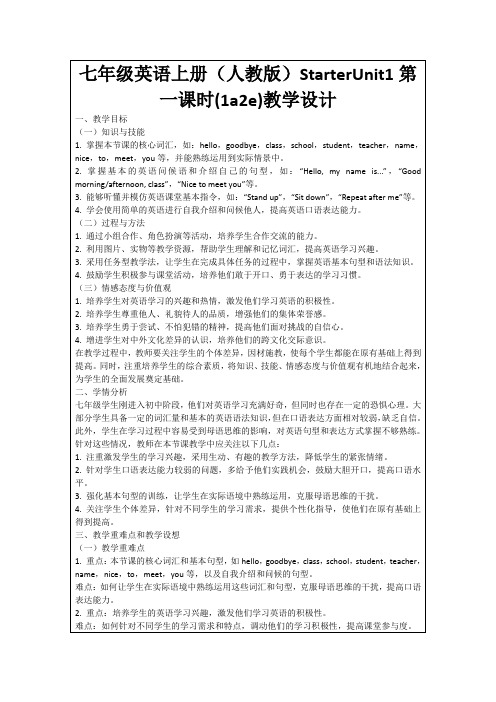
(四)课堂练习
1.教师设计一系列课堂练习,如:填空、选择、连线等,帮助学生巩固词汇和句型。
2.学生独立完成练习,教师巡回指导,解答疑问。
3.教师选取部分练习题进行讲解,帮助学生理解和掌握解题方法。
4.学生互相检查练习结果,互相学习,共同进步。
(五)总结归纳
1.教师带领学生回顾本节课所学内容,总结词汇和句型的重点、难点。
2.学生分享自己在课堂上的收获和感受,提出学习中遇到的问题。
3.教师针对学生的问题进行解答,总结教学方法,为下一节课做好准备。
4.鼓励学生课后继续练习英语口语,不断提高自己的英语水平。
五、作业布置
1.词汇练习:要求学生抄写本节课所学的核心词汇,每个单词写5遍,以提高词汇记忆效果。同时,鼓励学生尝试用这些词汇造句,加深对词汇的理解和运用。
3.采用任务型教学法,让学生在完成具体任务的过程中,掌握英语基本句型和语法知识。
4.鼓励学生积极参与课堂活动,培养他们敢于开口、勇于表达的学习习惯。
(三)情感态度与价值观
1.培养学生对英语学习的兴趣和热情,激发他们学习英语的积极性。
2.培养学生尊重他人、礼貌待人的品质,增强他们的集体荣誉感。
3.培养学生勇于尝试、不怕犯错的精神,提高他们面对挑战的自信心。
3.学生跟随教师,进行角色扮演,练习自我介绍和问候他人。
4.教师针对学生的表现给予及时反馈,纠正发音和语法错误,巩固所学内容。
(三)学生小组讨论
1.教师将学生分成若干小组,每组分配一个话题,如:介绍自己的学校、班级、家庭成员等。
2.学生在小组内用英语进行讨论,尝试运用本节课所学的词汇和句型。
英语级标准

英语级标准
英语级标准是用于衡量一个人掌握英语语言能力的标准。
目前,国际上使用最广泛的英语级标准是由剑桥大学考试委员会和英国文化协会联合开发的CEFR(共同欧洲语言参考框架)。
CEFR将英语语言能力分为6个等级:A1、A2、B1、B2、C1、C2。
A1和A2是入门级别,适合初学者;B1和B2是中级水平;C1和C2是高级水平,适用于英语母语人士或非母语但接近母语水平的人士。
通过参加CEFR所认可的各种英语考试,个人可以获得对应级别的证书。
这些证书可以作为在国内和国外求职、升学和申请移民的资料之一,表明个人的英语能力。
英语级标准在国际间统一起来,不仅方便个人和机构进行语言能力的比较和交流,也促进了英语教学和学习的标准化和规范化。
仁爱英语九年级上册Unit2Topic1SectionA(1a2)教学设计
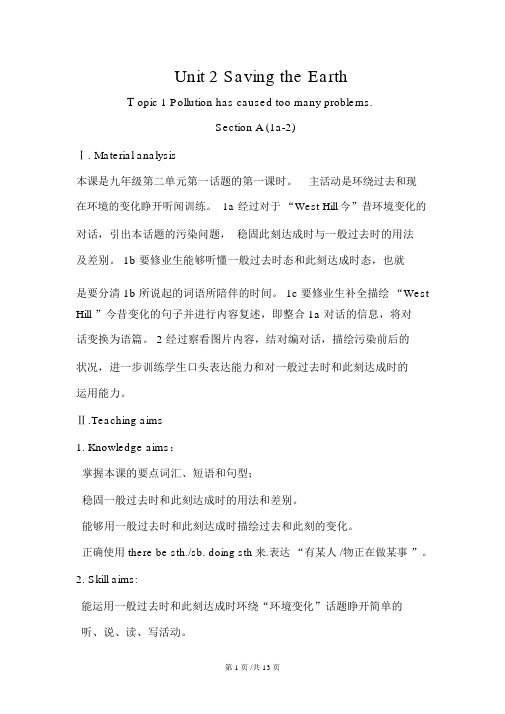
Unit 2 Saving the EarthT opic 1 Pollution has caused too many problems.Section A (1a-2)Ⅰ. Material analysis本课是九年级第二单元第一话题的第一课时。
主活动是环绕过去和现在环境的变化睁开听闻训练。
1a 经过对于“West Hill今”昔环境变化的对话,引出本话题的污染问题,稳固此刻达成时与一般过去时的用法及差别。
1b 要修业生能够听懂一般过去时态和此刻达成时态,也就是要分清 1b 所说起的词语所陪伴的时间。
1c 要修业生补全描绘“West Hill ”今昔变化的句子并进行内容复述,即整合 1a 对话的信息,将对话变换为语篇。
2 经过察看图片内容,结对编对话,描绘污染前后的状况,进一步训练学生口头表达能力和对一般过去时和此刻达成时的运用能力。
Ⅱ.Teaching aims1.Knowledge aims:掌握本课的要点词汇、短语和句型;稳固一般过去时和此刻达成时的用法和差别。
能够用一般过去时和此刻达成时描绘过去和此刻的变化。
正确使用 there be sth./sb. doing sth来.表达“有某人 /物正在做某事”。
2.Skill aims:能运用一般过去时和此刻达成时环绕“环境变化”话题睁开简单的听、说、读、写活动。
3. Emotional aims:学生认识境染的重性,并立保意。
4. Culture awareness:通文的学,学生认识境的化,关注全世界的境。
Ⅲ. The key points and difficult points1. Key points:Words and phrases: bee, butterfly, mess, shame, several, waste, pour,see sb./sth. doing sth., pour⋯into ⋯,villager,destroy,cut down, polluteSentences: What a mess! / What a shame!The flowers and grass have gone!What has happened here?There be sth./sb. doing sth.There are several factories pouring waste water into the stream.Everything has changed.Grammar: Differences between Simple Past and Present Perfect tense.2.Difficult points :能正确以口和面形式区使用一般去和在达成。
- 1、下载文档前请自行甄别文档内容的完整性,平台不提供额外的编辑、内容补充、找答案等附加服务。
- 2、"仅部分预览"的文档,不可在线预览部分如存在完整性等问题,可反馈申请退款(可完整预览的文档不适用该条件!)。
- 3、如文档侵犯您的权益,请联系客服反馈,我们会尽快为您处理(人工客服工作时间:9:00-18:30)。
A组1. for several times ,Linda made up her mind not for school.A.Being scolded;lateB.To have been scolded; being lateC.To be scolded; be lateD.Having been scolded;to be lateing into the room,I found them at the table, chess.A.seated;playingB.seating;playingC.seat;playD.seated;played3.----What terrible weather!We simply can't get the engine .-----Why not try the engine with hot water?A.started;to fillB.starting;to fillC.start ;filling;D.to start;filling4.From heart trouble for years,Dr.Carl has to take some medicine with him wherever he goes.A.SufferedB.SufferingC.Having sufferedD.Being suffered5.The visiting guests expressed their satisfaction for our city , that they had enjoyed their stay here .A.having addedB.to addC.addingD.added6.On what you are interested in ,you can probably find a museum to that subject.A.Depending;devotingB.Depended;devotedC.Depended;devotingD.Depending;devotedputers have transformed how we learn, kids everywhere a window into all of the world's knowledge.A.to giveB.givingC.givenD.being given8.----What should I do with this Paragraph.A.Finding outB.Found outC.Find outD.To find out9.Mr.Wang was really lucky to the US for further study.A.being sentB.to be sentC.having been sentD.to have been sent10.While cleaning the snow on the road, .A.a book was found on the groundB.a book appeared on the groundC.I found a book lying on the groundD.I I found a book laid on the ground11.The man didn't admit anything at the store when he was questioned by the police.A.to stealB.having stolenC.to have stolenD.having been stealing12.With two children middle school in the nearby town now,the parents are working hard.A.to attendB.attendingC.attendedD.having attended13.I really appreciate to help me ,but I am sure that I will be able to manage by myself.A.you go offerB.your offeringC.that you offerD.that you are offering14.He began to try every material the best way to work it out.A.known to findB.knowing to findC.knowing findingD.known finding15.Everything into account,I think the work is getting on well.A.TakeB.TakenC.TakingD.To take16.-----Where is Robert?He said he would meet me here at 9 o'clock.-----He seems with Mr.Smith in the office.A.to talkB.to be talkingC.to have talkedD.talking17.At in this way ,the present situation about H1N1 doesn't seem so disappointing.A.LookingB.LookedC.Having lookedD.To lookdies and gentlemen,please remain until the plane has come to a complete stop.A.seatedB.seatingC.to seatD.seat19.Little Bob is often educated by his parents to be good and friendly to anybody even if .A.attackingB.is attackedC.to be attackedD.attacked20. The right kind of training,these teenage soccer players may one day grow into international stars.A.GivingB.Having givenC.To giveD. Given21.When about his future plans,Xiao Shenyang said that he will make more interesting plays.A.askingB.askedC.to askD.being asked22.There have been several new events to the program for the 2008 Beijing Olympic Games.A.addB.to addC.addingD.added23. I can't stand with Jane in the same office.She just refuses talking while she works.A.working;stoppingB.to work;stoppingC.working;to stopD.added24.Daddy didn't mind what we were doing,as long as we were together, fun.A.hadB.haveC.to haveD.having25.An opening university provides you with a variety of courses especially for you go study in your own time.A.developB.develpingC.developedD.to develop26.There is nothing more I can try you to stay,so I wish you good luck.A.being persuadedB.persuadingC.to be persuadedD.to persuade27.The worldwide financial crisis set people why so many banks and companies areleft down one by one.A.thinking ;closingB.thinking;to be closedC.to think,closingD.to think;closed28.I hear some person in the kitchen.Can I call you back in minute?A.screamingB.screamedC.being screamedD.to be screamed29.John did quite well in his exams , how little he studied.A.considerB.consideringC.consideredD.to consider30.The children went home from the grammar school,their lessons for the day.A.finishingB.finishedC.had finishedD.were finished.A组1.I asked Miss Jones if I close the window.A.shallB.willC.wouldD.should2.---- the plane have taken off on time?-----I'm afraid not .The fog was too thick then.A.CanB.NeedC.MustD.Should3.It's said that there are plenty of hotels in that town.There be any difficulty for you to find somewhere to stay.A.wouldn'tB.mustn'tC.shouldn'tD.needn't4.On Sundays when I was a child ,Father and I get up early and go fishing.A.couldB.wouldC.mightD.should5.We last night,but we went to the concert instead.A.must have studiedB.might studyC.should have studiedD.would study6.You scold such a pupil who always keeps silent so seriously that you hurt him.A.should;canB.may;willC.mustn't mayD.can't ;must7.----You may laugh,but I've been thinking of becoming a vegetarian.-----Oh,you be out of your mind,You will be hungry all the time.A.mustB.mayC.willD.should8.---Tom came to work last Friday,but no one has seen him since.----- he have had an accident?A.ShouldB.MustC.MightD.Could9.It was really very dangerous;you him seriously.A.might have injuredB.may have injuredC.must injureD.need have injured10.---Mom's gift?She have chosen a better one for me .----She be very happy to know it .A.should;mustB.might ;wouldn'tC.couldn't;mustD.mustn't ;can't11.---- he have been chosen as captain of the football team?-----Yes,he .A.Can;must haveB.Must ;must haveC.Can ;mustD.Must;must12.You use my bike on condition that you give it back to me before I leave here.A.shouldB.mustC.ought toD.shall13.---Look,John's fallen asleep.----Oh,he too late last night.A.might sit upB.should have sat upC.could sit upD.must have sat up14.Don't be so anxious about that.Helen note.A.man leaveB.should leaveC.might have leftD.can have left15.It would be impossible for him to leave hospital tomorrow if he first aid when the accident happened.A.hadn't been givenB.wasn't be givenC.shouldn't be givenD.wouldn't be givenst year's SARS outbreak tells us that a sound public health system be built up and strengthened in our country.A.shouldB.canC.willD.may17.Why didn't you make me a telephone call yesterday?I about it.A.ought to tellB.ought to have been toldC.might have toldD.might have been told18.----Mum,I climbed to get the Teddy Bear from the top of the shelf.----My goodness!You yourself,You do that next time.A.must have hurt;mustn'tB.should have hurt;can'tC.may have hurt;mustn'tD.might have hurt; won't be able to19.---I have taken someone else's T-shirt by mistake.Is it Jane's?----It be hers.She seldom wears red.A.won'tB.can'tC.needn'tD.mustn't20.I had explored space in Shenzhou VI spaceship.!A.If onlyB.Now thatC.With the helpD.In spite of that21.you make so much noise?----I'm sorry,I'll take care not to .A.CanB.MustC.WouldD.Will22.Well,I could never imagine an honest boy like John cheat in the exam!A.wouldB.shouldC.couldD.might23.Bus No.66 comes every ten minutes ,there one coming.A.should haveB.must haveC.should beD.may be24.----Make sure that the windows are shut before you leave?----Ok,I .A.willB.doC.mustD.can25.He have finished his work;otherwise,he wouldn't be enjoying music in his study.A.shouldB.mustC.wouldn'tD.can't26.All visitors are waiting outside,Doctor White. they come in together or separately?A.WillB.CanC.ShallD.Would27.----The research on the new bird flu virus vaccine is challenging and demanding.Who do you think can do the job?---- my students have a try?A.ShallB.MustC.WillD.May28.If I had worked harder at school,I in a comtortable office now.A.would sitB.would have satC.would be sittingD.were sitting29.He suggested a meeting and it may be suggested he in our plan.A.to hold;was interestedB.不填;was interestedC.holding;should be interestedD.should hold;interested30.The careless man received a ticket for speeding.He so fast.A.mustn't have drivenB.couldn't have drivenC.can't have drivenD.shouldn't have driven。
